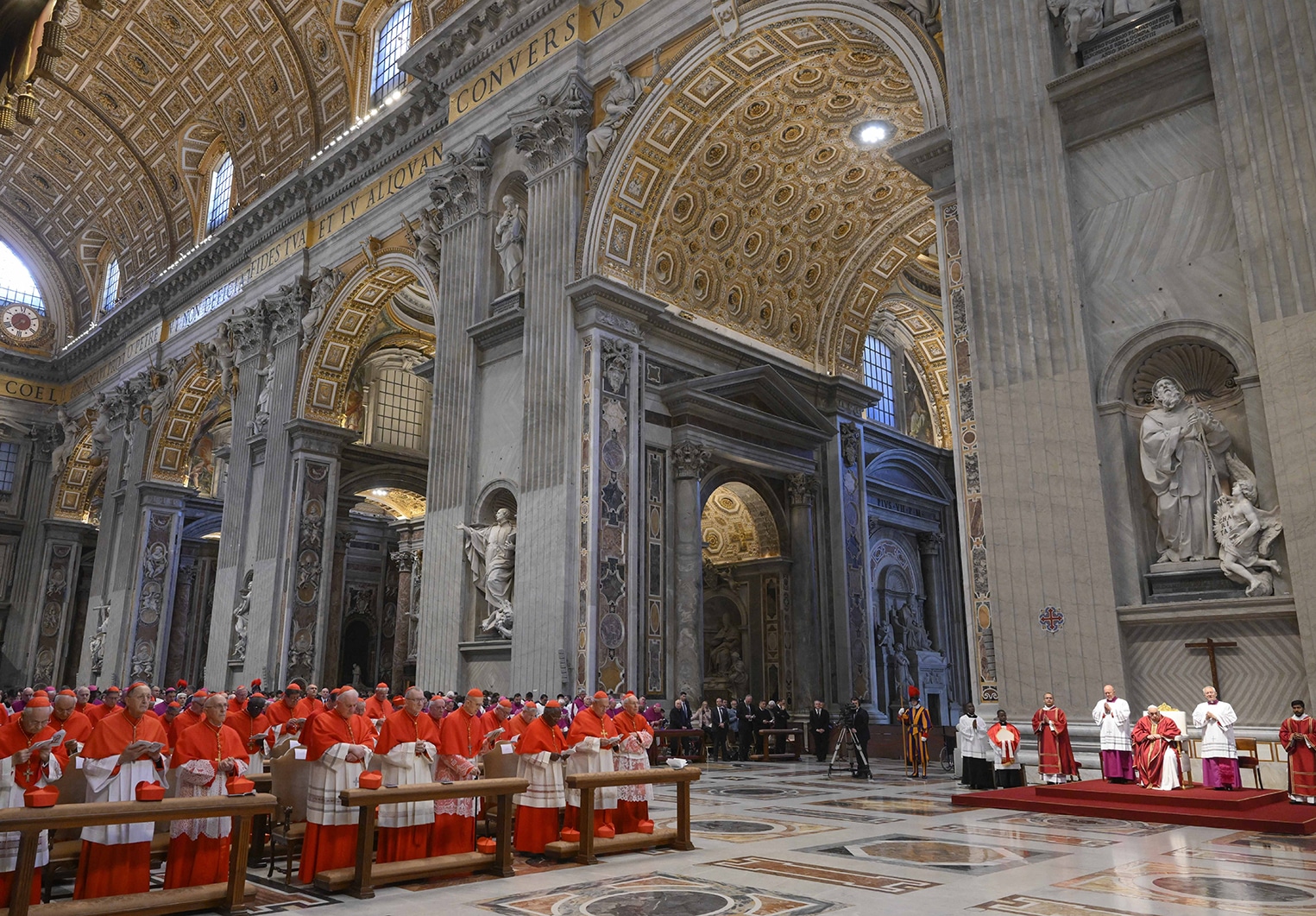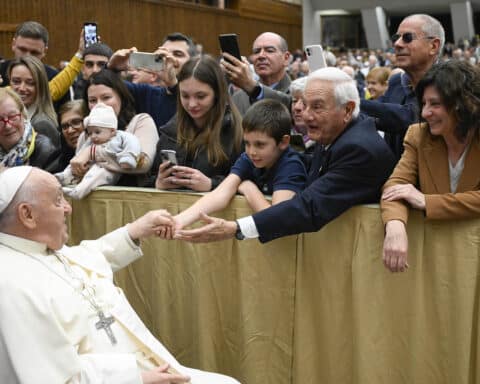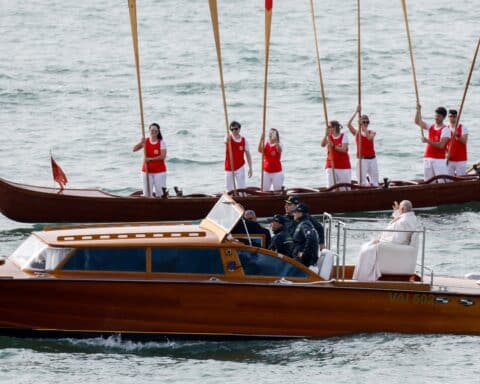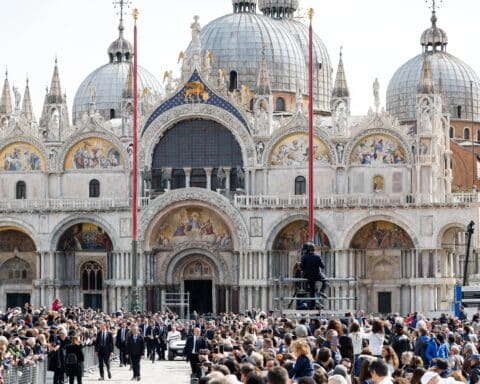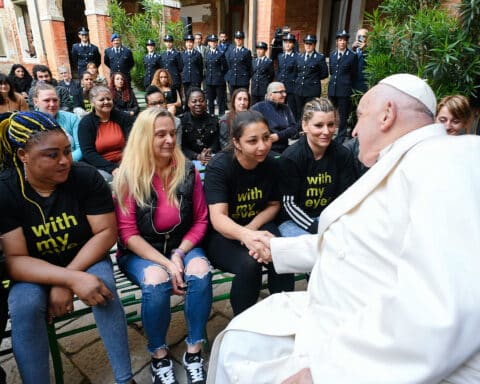VATICAN CITY (CNS) — The following are brief biographies of the 21 new cardinals who will be created by Pope Francis Sept. 30 at the Vatican:
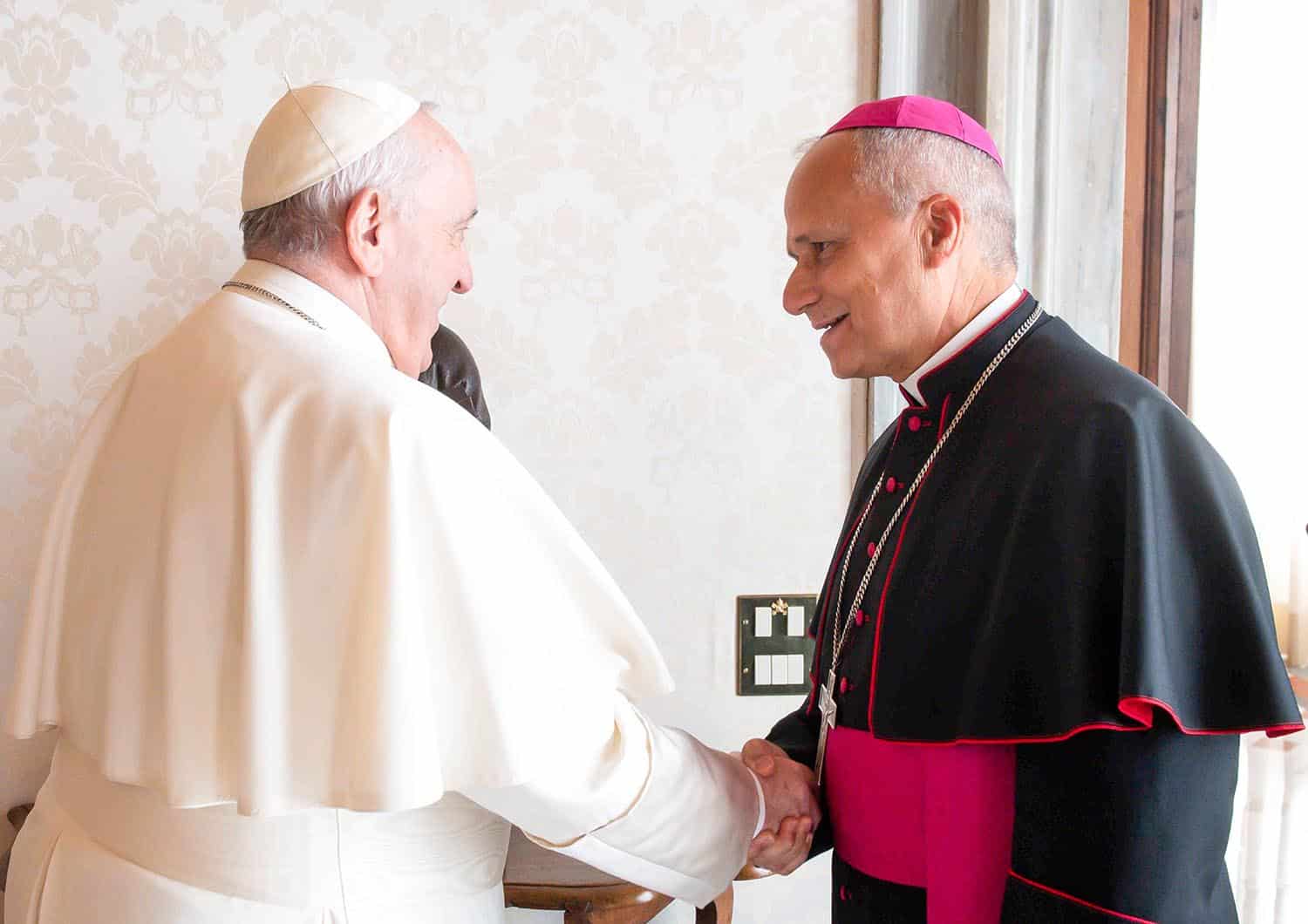
Cardinal-designate Robert F. Prevost
Cardinal-designate Robert F. Prevost, 67, is prefect of the Dicastery for Bishops, the Vatican body responsible for recommending to the pope candidates to fill the office of bishop in many of the Latin-rite dioceses of the world. He also oversees the Pontifical Commission for Latin America, where nearly 40% of the world’s Catholics reside.
A Chicago native, he also served as prior general of the Augustinians and spent a total of little more than two decades serving in Peru, first as an Augustinian missionary and later as bishop of Chiclayo.
Soon after coming to Rome to head the dicastery, he told Vatican News that bishops have a special mission of promoting the unity of the Church.
“The lack of unity is a wound that the Church suffers, a very painful one,” he said May 4, 2023. “Divisions and polemics in the church do not help anything. We bishops especially must accelerate this movement toward unity, toward communion in the church.”
The cardinal-designate was born Sept. 14, 1955 in Chicago, Illinois, to a father of French and Italian descent and mother of Spanish descent.
He holds degrees from Villanova University in Pennsylvania and the Catholic Theological Union in Chicago and a doctorate from the Pontifical University of St. Thomas Aquinas in Rome. An Augustinian friar, he joined the Augustinian mission in Peru in 1985 and largely worked in the country until 1999 when he was elected head of the Augustinians’ Chicago-based province. From 2001 to 2013, he served as prior general of the worldwide order. In 2014, Pope Francis named him bishop of Chiclayo, in northern Peru and the pope asked him also to be apostolic administrator of Callao, Peru, from April 2020 to May 2021.
He was re-elected second vice-president of Peru’s Bishops’ Conference in 2022 and the pope then appointed him to succeed the retiring Canadian Cardinal Marc Ouellet as prefect of the Dicastery for Bishops in early 2023.
Cardinal-designate Prevost speaks English, Spanish, Italian, French, Portuguese and can read Latin and German.
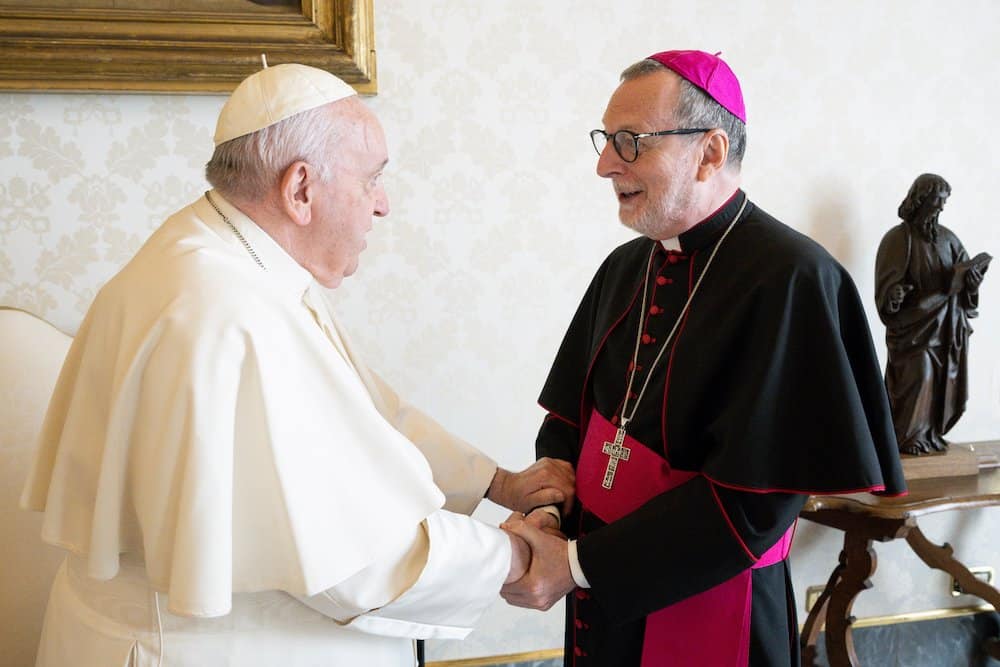
Cardinal-designate Claudio Gugerotti
Italian Cardinal-designate Claudio Gugerotti, 67, is prefect of the Dicastery for Eastern Churches and has years of experience working closely with Eastern Catholics and Orthodox leaders and faithful, especially in the Caucasus region and Eastern Europe, where he served as a papal nuncio.
As nuncio, he was the Vatican’s diplomatic representative to Georgia during the run-up to and aftermath of the 2008 Georgian attack on the breakaway province of South Ossetia followed by a Russian invasion of Georgia. The five-day conflict left at least 800 people dead and tens of thousands more fled their homes.
He had long warned that the poverty, political instability and major energy resources found in the Caucasus region made it a potential “powder keg” for violence, he said in 2004 when he was nuncio to Armenia, Azerbaijan and Georgia.
Ethnic and religious differences, independence movements and the fight for territorial control had sparked “a confrontation without limits and without morality,” he had said after a three-day siege by terrorists of a school in Beslan in Russia’s North Ossetia province, which ended with the deaths of 333 children and adults.
Religious leaders have a serious responsibility to educate their communities in the region for peace, dialogue and respect for others, and to “reinforce positive values … and curb the risks of manipulating religion, which some try to do, finding easy success amid ignorance and poverty,” he had said.
Born in Verona, Italy, Oct. 7, 1955, he earned degrees in Oriental languages and literature and in liturgy. He was ordained to the priesthood in 1982 and taught patristics and Eastern theology and liturgy at institutes in Verona until 1985.
He began working at the then-Congregation for Eastern Churches in 1985 and was named undersecretary in 1997, also teaching patristics and Armenian literature and language at Rome’s Pontifical Oriental Institute.
He was nuncio to Armenia, Georgia and Azerbaijan from 2002 to 2011, nuncio to Belarus from 2011 to 2015, nuncio to Ukraine from 2015 to 2020 and nuncio to Great Britain from 2020 to 2022 when Pope Francis appointed him to head the Vatican dicastery that assists all the Eastern Catholic Churches — most of which are based in the Middle East, North Africa and Eastern Europe, including Ukraine — as well as the Latin-rite Church across North Africa and the Middle East.
Fluent in Italian, he also is familiar with English, French, Kurdish, classical and modern Armenian, Latin and Greek, according to the Vatican.
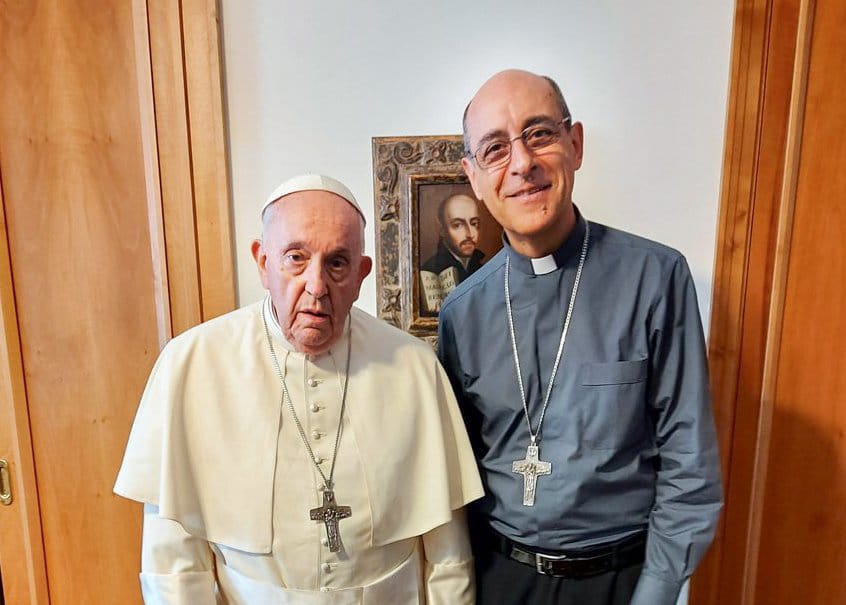
Cardinal-designate Víctor Fernández
Argentine Cardinal-designate Víctor Fernández, who will be 61 July 18, is prefect of the Dicastery for the Doctrine of the Faith and the first Latin American to head this office in its nearly 500-year history. He has had a long close relationship with his fellow countryman, Pope Francis, and is familiar with the thought and vision of the pope; he has been credited for contributing to several significant texts of his pontificate.
Cardinal-designate Fernández was a key collaborator in 2007 of then-Cardinal Jorge Bergoglio in drafting the Latin American bishops’ Aparecida document, which offers a pastoral vision and guidelines for the region’s church and which, in turn, has been a blueprint for his pontificate.
Pope Francis promptly named him an archbishop after his election to the papacy in 2013 and, at the Vatican, the cardinal-designate was a member of the drafting committees for the final documents of the 2014 and 2015 Synods of Bishops.
Responding to reporters’ questions during the synod on the family in 2014, the then-archbishop said synod members who support pastoral flexibility in dealing with people in irregular situations are not promoting “marriage-lite” or a weakening of the lifelong bond of marriage, they want to meet those people, support them and, hopefully, lead them closer to holiness.
The Gospel, he said, also should arrive at the places “where the biggest sinners are” — that’s the example Jesus gave his followers.
Born July 18, 1962, near Córdoba, he studied theology with a specialization in biblical studies at Rome’s Pontifical Gregorian University and obtained a doctorate from the Pontifical Catholic University of Argentina.
He spent years as a parish priest, a director of catechesis and an adviser of lay movements. He founded and was rector of an educational institute for teachers and a diocesan institute for lay formation. He was formator and director of studies at the seminary of Río Cuarto and was dean of the faculty of theology at the Pontifical Catholic University of Argentina. The future Pope Francis, as archbishop of Buenos Aires, nominated then-Father Fernández to become rector of the pontifical university in 2009, a position he held until 2018.
Before his July appointment to lead the doctrinal dicastery, he had been president of the doctrine commission of Argentina’s bishops’ conference since 2017 and archbishop of La Plata since 2018. His new role at the Vatican also includes serving as president of the Pontifical Biblical Commission and president of the International Theological Commission.
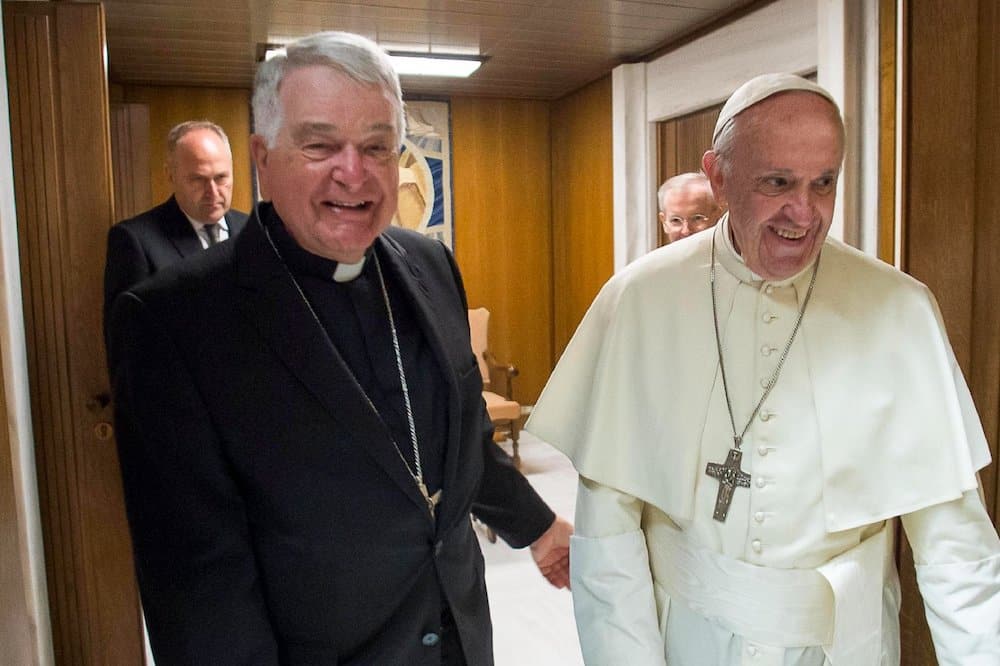
Swiss Cardinal-designate Emil P. Tscherrig
Swiss Cardinal-designate Emil P. Tscherrig, 76, has spent the past three decades serving as a Vatican diplomat, and became the first non-Italian papal nuncio to Italy and the Republic of San Marino when Pope Francis appointed him in 2017.
Pope Francis got to personally know him when the Swiss prelate was appointed papal nuncio to Argentina in January 2012. In fact, the night then-Cardinal Jorge Bergoglio of Buenos Aires was elected pope in 2013, the new pope phoned the Vatican ambassador and asked him to tell the country’s bishops and faithful not to feel obliged to come to Rome for his installation, but instead give the money to the poor and pray for his new ministry.
Then-Archbishop Tscherrig wrote to all the bishops March 14 conveying the Argentine pope’s sentiments, expressing to the faithful “his gratitude for your prayers and expressions of love, affection and charity” and requesting they accompany their spiritual closeness “with some act of charity toward those in need.”
Born Feb. 3, 1947, in Unterems, Switzerland, he was ordained to the priesthood in 1974. He earned his doctorate in canon law from Rome’s Pontifical Gregorian University and began his diplomatic studies at the Vatican in 1978.
He worked at the Vatican Secretariat of State for many years, helping plan then-Pope John Paul II’s many foreign trips. He served as support staff at nunciatures in Uganda, South Korea, Mongolia and Bangladesh, and with his episcopal ordination, he received his first assignment as papal nuncio in 1996 to Burundi where lingering ethnic violent conflict among Hutu and Tutsi armed militants and the army had plunged the country into a civil war.
He was then appointed to the West Indies and some other Central and South American mainland nations whose coasts line the Caribbean starting in 2000 and 2001. He became papal nuncio to Korea and Mongolia in 2004, and then to Sweden, Denmark, Finland, Iceland and Norway in 2008. He served as apostolic nuncio to Argentina from 2012 to 2017.
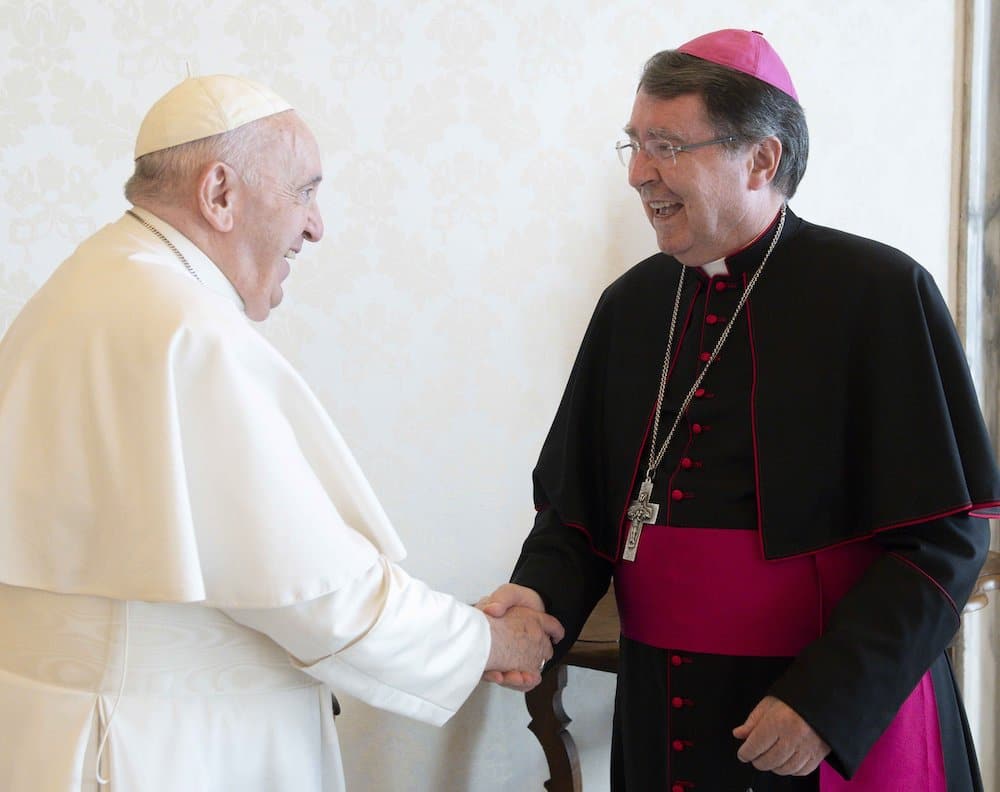
Cardinal-designate Christophe Pierre
French Cardinal-designate Christophe Pierre, 77, has worked the past 46 years in the Vatican’s diplomatic service, most recently as papal nuncio to the United States.
Before heading to the apostolic nunciature in Washington D.C., he had served nine years as nuncio to Mexico, giving him an in-depth understanding of many issues of concern for both countries, particularly migration and the growing numbers of child migrants from Central America.
When Pope Francis appointed him as nuncio to the United States in 2016, replacing retiring Italian Archbishop Carlo Viganò, Cardinal-designate Pierre worked to explain the pope’s priorities, foster unity in the Church in the U.S. and be a dedicated pastor by attending numerous Church events, initiatives and talks.
He regularly addressed the U.S. bishops at their spring and fall assemblies, where he repeatedly encouraged the Church’s missionary role of spreading the beauty of the Gospel message, particularly by bringing Christ’s love to the marginalized and his healing to the wounded.
He likened his years as apostolic nuncio as being on journey together with the U.S. bishops during which they had spanned the challenges of religious disaffiliation, the sexual abuse crisis, increasing secularization, polarization within the nation and the Church, and the global pandemic, he told the bishops at their fall general assembly in 2021.
Echoing Pope Francis’ emphasis on listening, walking and discerning together with the Holy Spirit, he said at the time, “I believe that synodality is an answer to the challenges of our time and to the confrontation, which is threatening to divide this country, and which also has its echoes in the Church.”
“It is only through a courageous and humble synodal unity that we, as bishops, will be fully equipped to apply divine power to the problems that weigh heavily on our people today,” he told them most recently at the bishops’ general assembly in June 2023.
Born Jan. 30, 1946, in Rennes, France, he spent some of his early school years in Madagascar and Morocco, and served two years in the military.
Ordained to the priesthood in 1970, he earned degrees in theology and canon law, and entered the Vatican’s diplomatic service in 1977. His first post was as support staff in New Zealand, followed by Mozambique, Zimbabwe, Cuba, Brazil and then with the Vatican’s permanent mission representative to U.N. agencies in Geneva.
St. John Paul II then named him papal nuncio to Haiti in 1995 in the aftermath of a violent military junta and a U.S. and international intervention to restore the government of Father Jean-Bertrand Aristide. He was then appointed nuncio to Uganda in 1999, Mexico in 2007 and the United States in 2016.
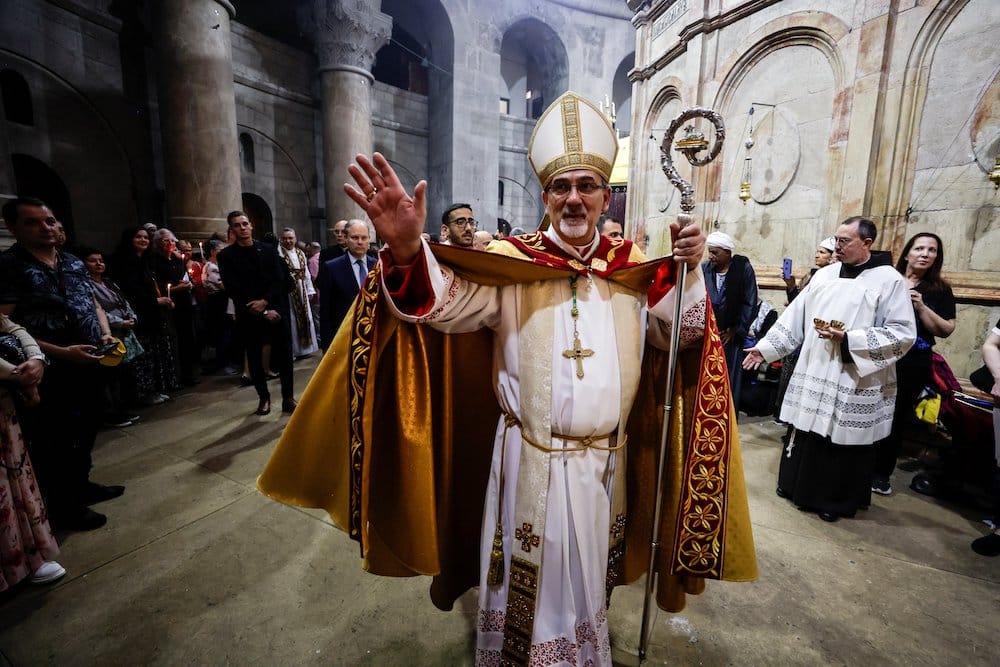
Cardinal-designate Pierbattista Pizzaballa
Italian Cardinal-designate Pierbattista Pizzaballa, 58, will be the first Latin patriarch of Jerusalem to be elevated to the College of Cardinals.
Serving for three decades in the Holy Land, which is a sacred place for the three Abrahamic religions as well as a locus of tension and conflict, the cardinal-designate said his elevation is an invitation for dialogue and reconciliation.
By making the patriarch of Jerusalem a cardinal, Pope Francis is showing his care and esteem “for the mother Church, the Church of Jerusalem,” Cardinal-designate Pizzaballa told Vatican News July 9.
The Church there has a vocation to foster “universality, dialogue, encounter,” but it also has “the mission to call all Christians and non-Christians above all to reconciliation,” he said. Creating him cardinal, therefore, is an “invitation to continue on this path.”
Born April 21, 1965, near Bergamo in northern Italy, Cardinal-designate Pizzaballa joined the Order of Friars Minor in 1985 and was ordained a Franciscan priest in 1990.
He specialized in biblical theology at the Studium Biblicum Franciscanum in Jerusalem and became fluent in Hebrew and English in addition to his native Italian. He oversaw the publication of the Roman Missal in Hebrew in 1995 and he translated a number of liturgical texts for Catholics who live in Israel.
In 1999, he formally began serving the Franciscan Custody of the Holy Land, which maintains most of the Christian biblical sites in the Holy Land, and he served as vicar general of the Latin Patriarchate of Jerusalem, attending to the pastoral needs of Hebrew-speaking Catholics in Israel. He has been an adviser for the Vatican’s Commission for Religious Relations With the Jews since 2008.
He was appointed the head of the Franciscan Custody of the Holy Land in 2004 for a six-year term, which was successively renewed for a three-year term in 2010 and 2013. Pope Francis appointed him as apostolic administrator of the Latin Patriarchate of Jerusalem in 2016 after Patriarch Fouad Twal of Jerusalem retired. He named him to be the new patriarch in 2020.
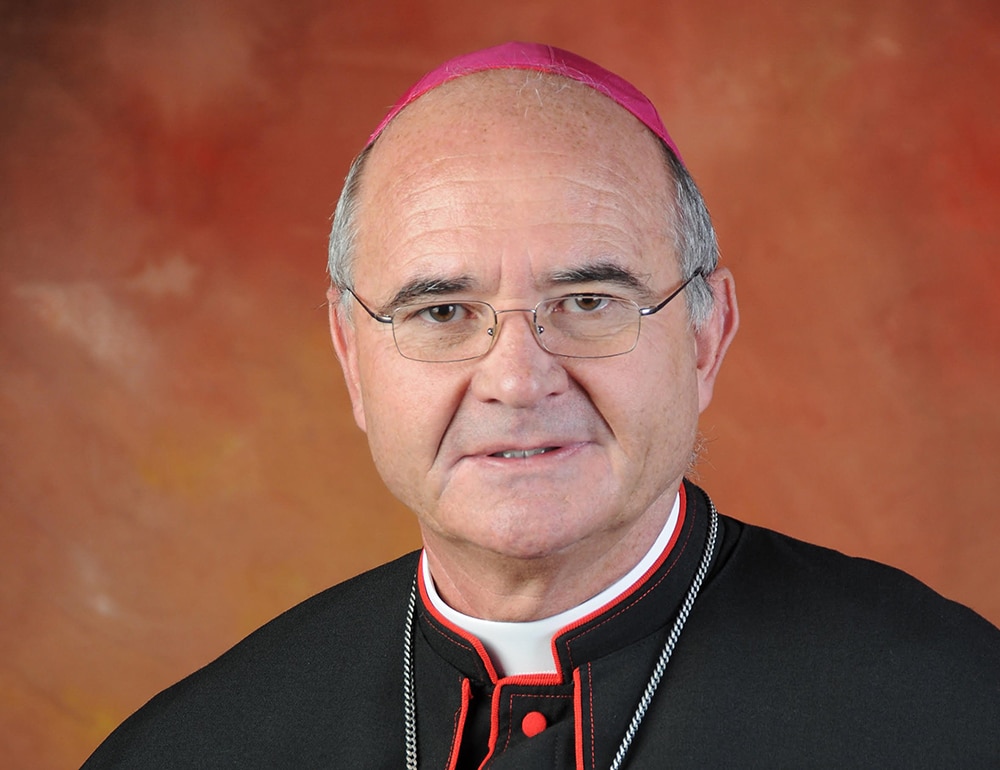
Cardinal-designate Stephen Brislin
Cardinal-designate Stephen Brislin, 66, is archbishop of Cape Town, South Africa.
The cardinal-designate is the former president of the Southern African bishops’ conference — composed of bishops from Botswana, South Africa and Eswatini — and has been vocal about the social problems plaguing South Africa, which recently is experiencing frequent blackouts and widespread unrest caused by economic difficulties.
One of the biggest challenges facing the Church in South Africa, he told Vatican News after his nomination as cardinal, is “to bring about healing, particularly the healing of relationships because we are a broken society,” particularly due to the country’s legacy of apartheid.
He said the Church also has an important role to play in “motivating and advocating for a more just economic system” to combat staggering wealth inequality in South Africa.
Cardinal-designate Brislin also noted how South Africans “really responded” to the listening sessions of the synod and expressed hope that the idea of synodality be “something that we can develop more locally, to become that listening Church, that discerning Church and really (open) ourselves to God’s Holy Spirit.”
The cardinal-designate is of Scottish and Irish origin and was born Sept. 24, 1956, in Welkom, South Africa. He studied psychology at the University of Cape Town before entering the seminary in Pretoria. He later studied theology at the Mill Hill Missionary Institute in London.
He was ordained a priest in 1983 for the diocese of Kroonstad, South Africa, where he was then appointed bishop by Pope Benedict XVI in 2006. Pope Benedict named him archbishop of Cape Town in 2009.
He was president of the Southern African bishops’ conference from 2013 to 2019.
Cardinal-designate Brislin will be one of three cardinals from Africa created at the Sept. 30 consistory.
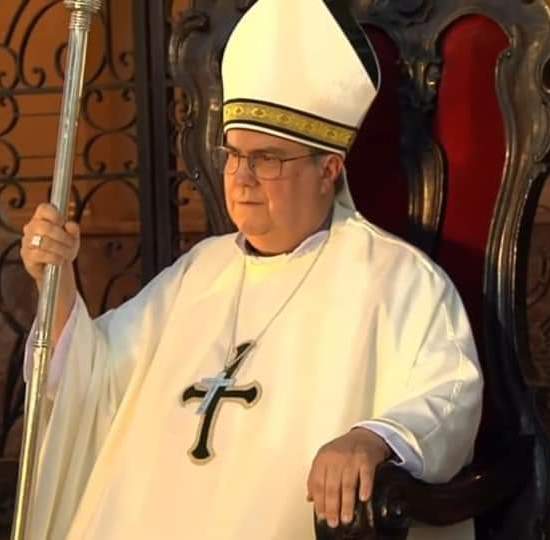
Cardinal-designate Ángel Sixto Rossi
Argentine Jesuit Cardinal-designate Ángel Sixto Rossi, 64, is archbishop of Córdoba, Argentina.
The cardinal-designate has authored several books on spirituality and education for both young people and adults. When he was archbishop of Buenos Aires, Pope Francis penned the prologue to his book “Small Things with Great Love,” writing: “Ángel Rossi is a priest who calls people with his word. When people know he is speaking, people come close, young people, families, sinners who line up at his confessional, radio listeners, everyone comes close.”
Cardinal-designate Rossi regularly leads retreats centered on the Ignatian spiritual exercises for priests, religious and laypeople.
Born Aug. 11, 1958, in Córdoba, he entered the Jesuit novitiate in 1976 when Jesuit Father Jorge Bergoglio, the future Pope Francis, was provincial superior of the Jesuits in Argentina.
He earned a licentiate in spiritual theology from Rome’s Pontifical Gregorian University in 1986 with a thesis on Ignatian spiritual discernment. From 1990 to 1992 he was rector of a Church in Buenos Aires, where he founded the Home of St. Joseph to care for homeless people. He also created the Open Hands Foundation which assists poor and vulnerable people throughout Argentina. From 2013 to 2019 he was superior of the Jesuit community residing at Córdoba. He was provincial adviser for the Argentina-Uruguay Jesuit province.
Pope Francis appointed him archbishop of Córdoba in 2021. He was named a cardinal along with two other Argentinians who will receive hats at the Sept. 30 consistory.
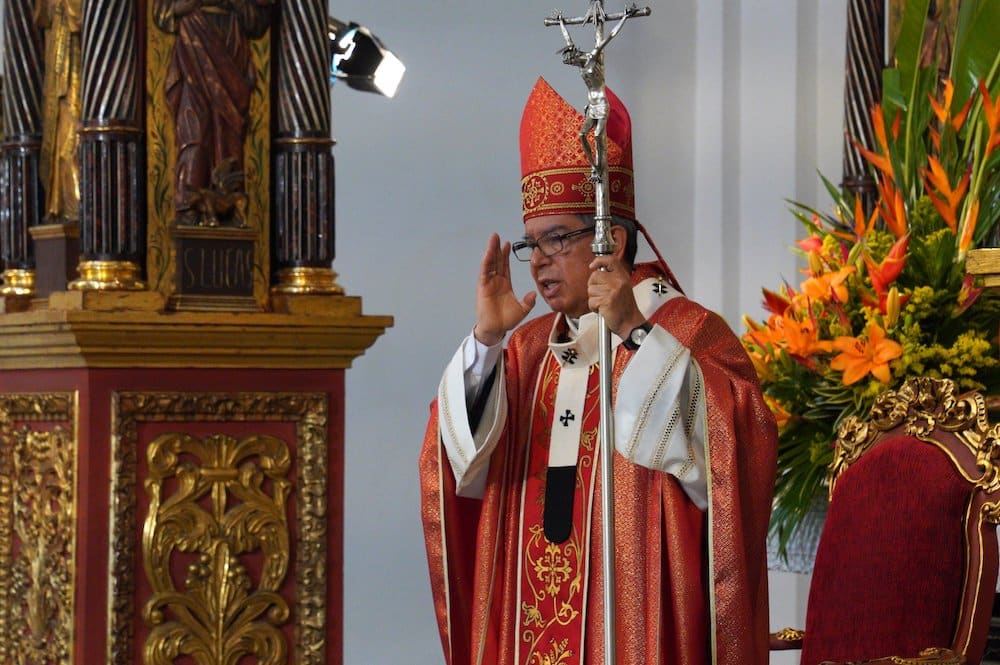
Cardinal-designate Luis José Rueda Aparicio
Colombian Cardinal-designate Luis José Rueda Aparicio, 61, is archbishop of Bogotá, Colombia. He has been a vocal supporter of a 2016 peace agreement to end decades of violence between the Colombian government and the left-wing guerilla group FARC. While the agreement remains intact, incidents of violence by FARC dissidents have continued throughout the country.
“Colombia cannot become accustomed to violence, Colombia cannot stay in the mafia culture of the drug trade that makes us not respect life,” he said after his nomination as cardinal.
In a statement he expressed his hope that all Colombians, lay people and religious, commit themselves to “working to support life and for the reconciliation of all Colombians.”
“May war and violence end, that kidnappings finish and we may be able to work united and do away with polarization,” he said.
The cardinal-designate has also been outspoken on Indigenous rights and environmental issues. During the Colombian bishops’ ad limina visit to Rome in 2012, the cardinal-designate said his fellow bishops had asked the Vatican to consider the institution of an Amazonian rite.
He was born March 3, 1962, north of Bogotá as the 10th of 11 children and he grew up working with his father in construction, selling newspapers and in a cement factory before entering the seminary. He was ordained a priest in 1989 and earned a licentiate in moral theology from Rome’s Alphonsian Academy before undertaking several pastoral assignments throughout Colombia.
Pope Benedict XVI named him bishop of Montelíbano in 2012, and in 2018, Pope Francis appointed him archbishop of Popayán. In 2020, he was named archbishop of Bogotá and was elected president of the Colombian bishops’ conference the following year.
As of Sept. 30, 2023, he will be the only Colombian cardinal eligible to vote in a future conclave.
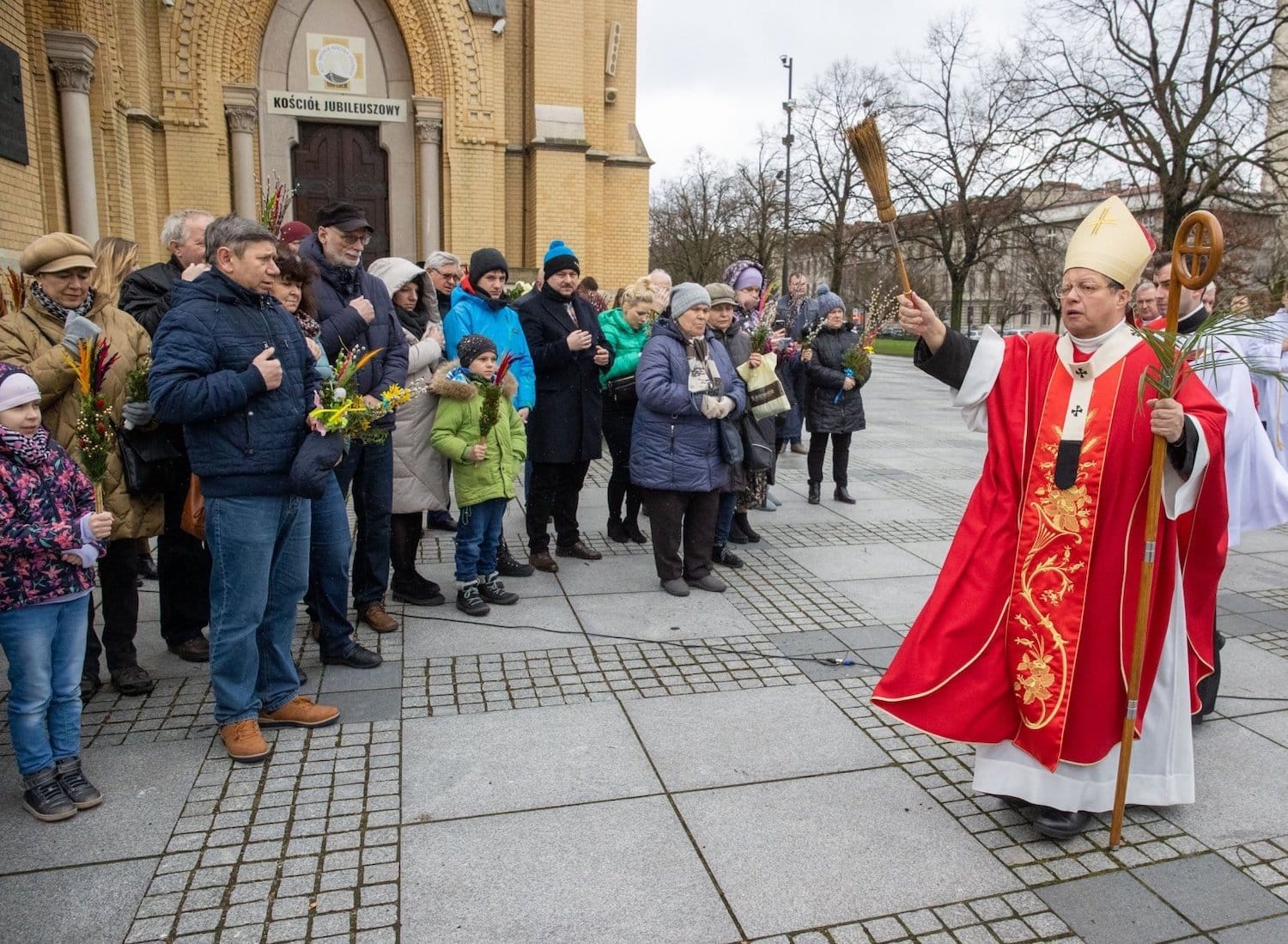
Cardinal-designate Grzegorz Rys
Polish Cardinal-designate Grzegorz Rys, 59, is archbishop of Lódz, Poland.
Known among Poland’s Catholics as a prolific writer on the faith, the cardinal-designate has authored more than 50 books with topics ranging from devotional practices to engagement with the secular world and with titles as simple as “Rosary” to “There is Room for Everyone in the Church.”
Polish media reported in 2016 that Cardinal-designate Rys wrote the reflections for the Stations of the Cross at that year’s World Youth Day in Kraków, which focused on the 14 corporal and spiritual works of mercy.
As archbishop, he launched a synod in his archdiocese to address the priest shortage, after which he established the permanent diaconate and created an international seminary for seminarians belonging to the Neocatechumenal Way.
“I think we are at a point where the Holy Spirit is calling us to de-clericalize the Church wherever we can. The Church should not be clerical at all,” he said in a 2022 interview with the Polish publication Gosc Niedzielny. “This is what we learn in the synodal Church. This synodality is not about sitting down once a month in a small team and discussing the Church. It is about co-responsibility, about communion in action.”
The archbishop was also appointed by the pope to participate in the upcoming Synod of Bishops on Synodality.
Born Feb. 9, 1964, in Kraków, he studied history and theology at the Pontifical Academy for Theology in Kraków (later named the Pontifical University of John Paul II) and was ordained a priest in 1988. In 1994, he earned his doctorate in popular medieval piety in Poland and in 2000 earned a postdoctoral degree in history. He began ministering as a parish priest in 1988 and became rector of the archdiocesan seminary in Kraków in 2007. In 2011, Pope Benedict XVI appointed him auxiliary bishop for the Diocese of Kraków. Pope Francis named him archbishop of Lódz in 2017, and in 2020 appointed him a member of the Dicastery for Bishops.
Cardinal-designate Rys is the first Pole to join the College of Cardinals after Cardinal Konrad Krajewski — papal almoner and a key ally of Pope Francis in delivering aid to people in war-ravaged Ukraine.
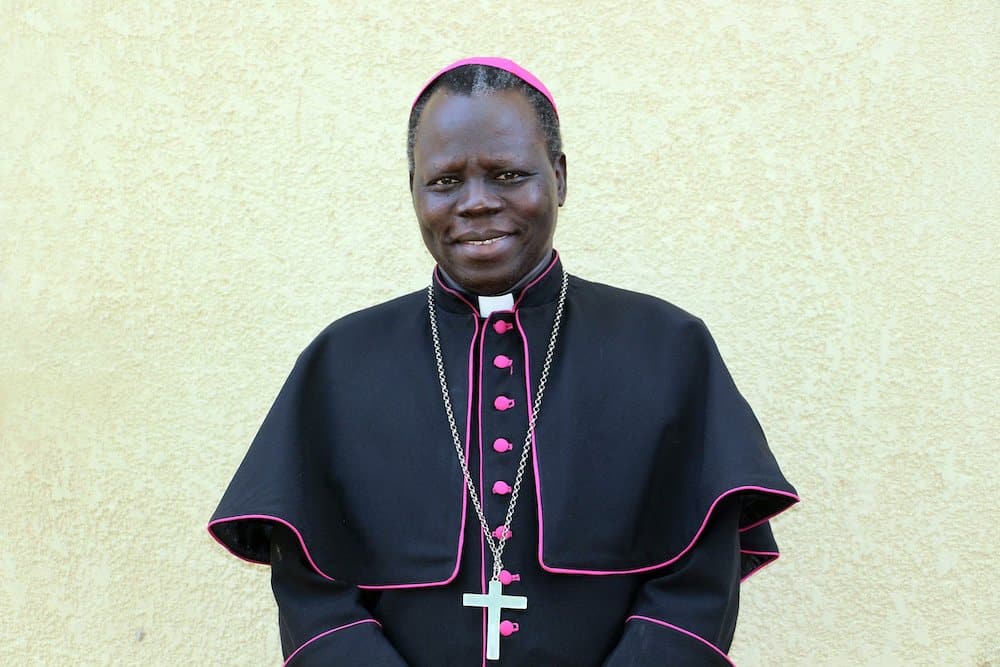
Cardinal-designate Stephen Ameyu Martin Mulla
Cardinal-designate Stephen Ameyu Martin Mulla, 59, is archbishop of Juba, South Sudan. Pope Francis has long worked to foster peace in South Sudan and by naming a cardinal in Juba, he will be giving greater weight to the Catholic Church’s voice in the nation.
Cardinal-designate Mulla worked closely with Pope Francis during the pope’s visit to South Sudan in 2023 and there were poignant moments of them together, such as riding in the popemobile before the trip’s closing Mass in Juba and the cardinal-designate publicly greeted the pope onstage to thank him for his visit.
While “it is discouraging that the peace process has moved forward so slowly,” he told the pope, the country shares his “fatherly concern for the restoration of peace.”
“Your Holiness, our country is truly suffering due to the civil war. Therefore, we are looking for peace and reconciliation. However, the peace which our country so badly needs is not a purely human peace based on personal interest, but rather the peace of Jesus,” he told the pope.
Cardinal-designate Mulla has been an outspoken critic of tribal violence that fueled the country’s civil war from 2013 to 2018 calling it “the greatest enemy of South Sudan.” Incidents of tribally motivated violence persist despite a peace agreement.
“We cannot build our nation or the Church by basing them on tribalism: if we do, we will say there is no baptism, no Communion, no confirmation, and we will fall because it is something that divides us,” he said in a homily in 2022.
Born Jan. 10, 1964, in Ido, near Juba, the cardinal-designate earned a doctorate from Rome’s Pontifical Urbaniana University in dogmatic theology with a thesis titled “Toward Religious Dialogue and Reconciliation in Sudan.” He was ordained a priest of the Diocese of Torit in 1991 and he taught at the seminary in Juba and later became its rector.
In January 2019, Pope Francis named him bishop of Torit near South Sudan’s border with Uganda — home to some 1.1 million Catholics, greater than the capital Juba’s estimated 880,000 Catholics. In December of that same year, Pope Francis named him archbishop of Juba. He also served as apostolic administrator of the Diocese of Torit and the Diocese of Wau.
His appointment as archbishop of Juba stirred opposition from some members of the archdiocese who said the archbishop was unsuitable for the role and had broken his promise of chastity. After a Vatican investigation into the claims, Pope Francis confirmed the appointment.
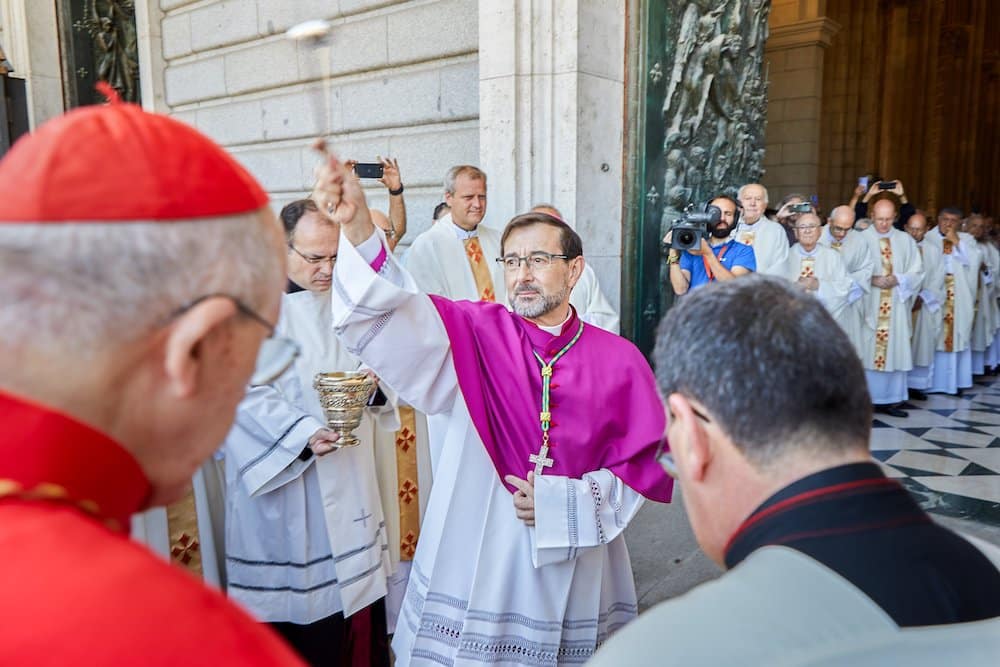
Spanish Cardinal-designate José Cobo Cano
Spanish Cardinal-designate José Cobo Cano, 57, has been archbishop of Madrid since June. In an interview with the Spanish press after he was named archbishop of Madrid, the cardinal-designate said that he believed Pope Francis had selected a relatively young prelate for such a large archdiocese — Madrid is home to approximately 3.3 million Catholics — because he wants leaders who are “seasoned” in pastoral care and who “know how people live.”
The pope, he said, does not strictly want bishops who have written books on theology and lead academic conferences, but “people who can lead others forward to make decisions together.”
The archbishop told Vatican News in 2023 that one of the greatest risks facing his archdiocese is the “uprooting of young people and the lack of hope.”
“I think we have a youth that is searching, that is perplexed, that perhaps lacks models, but we have a Church that offers the wonder of the Gospel,” he said.
When he was head of the secretariat for migration at the Spanish bishops’ conference, Cardinal-designate Cobo noted the responsibility of the Church to respond to growing migration in southern Europe and worldwide.
“Migration is not simply an event or phenomenon, migration is made of people as the pope constantly reminds us,” he said. “We have the great challenge of putting migrants in the places they deserve as people, as active members of our Christian communities.”
Cardinal-designate Cobo was born Sept. 20, 1965, in Spain’s southern Andalucía region. When he was 7 years old his family moved to Madrid where he became very involved in parish life.
After graduating with a law degree he entered the seminary in Madrid. He studied moral theology at Comillas Pontifical University in Spain and he is considered an expert in Catholic social teaching. He was ordained a priest in 1994 and worked in parishes throughout Madrid.
Pope Francis named him auxiliary bishop of Madrid in 2017 and since 2018 he has worked on commissions within the Spanish bishops’ conference dealing with pastoral issues.
The cardinal-designate will be among three Spanish-born prelates to receive a red hat at the Sept. 30 consistory, along with cardinals-designate François-Xavier Bustillo and Ángel Fernández Artime.
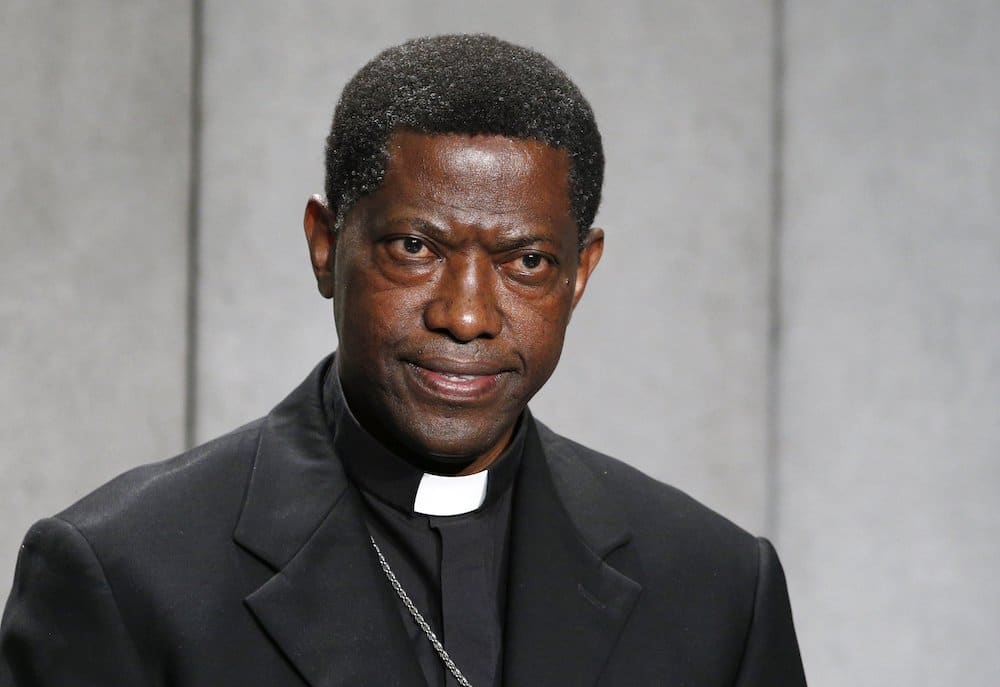
Cardinal-designate Protase Rugambwa
Tanzanian Cardinal-designate Protase Rugambwa, 63, is coadjutor archbishop of Tabora, Tanzania, and has a strong background in evangelization.
He told ACI Africa in an interview after his nomination as cardinal that “the mission of evangelization continues even though it is now more demanding and even engaging not only at the local level but also at the international realm of life and action.”
Born May 31, 1960, in Bunena, Tanzania, he was ordained a priest by St. John Paul II during the pope’s apostolic visit to Tanzania in 1990. He earned a doctorate in pastoral theology at Rome’s Lateran University in 1998. After working as a vocational director, a teacher, the secretary of the diocese’s pastoral department and vicar general of the Diocese of Rulenge-Ngara, he returned to Rome in 2002 to work in the then-Congregation for the Evangelization of Peoples.
Pope Benedict XVI named him a titular bishop in 2008 and later received the personal title of archbishop in 2012, when he was also appointed secretary of the evangelization congregation and president of the Pontifical Mission Societies.
As secretary for the Dicastery for Evangelization, Cardinal-designate Rugambwa urged central African bishops in a report to address the effects of mass migration on young people.
“The whole Church, starting with us pastors, must commit itself to dealing with this migratory phenomenon, evaluating its positive and negative elements,” he wrote, adding that it is necessary “to help the youth of Central Africa not to waste, but rather to shape an identity that values their origins, their culture and their religiosity in the encounter with new cultural and religious schemes and models.”
“All the baptized must be prepared to become missionary disciples, including the young people of today and tomorrow,” he wrote in the report.
Pope Francis named him coadjutor archbishop of Tabora, Tanzania, in April 2023. Cardinal-designate Rugumbwa is the third cardinal from Tanzania.
Cardinal-designate Sebastian Francis
Cardinal-designate Sebastian Francis, 71, is bishop of Penang, Malaysia, and president of the bishops’ conference of Malaysia, Singapore and Brunei.
After his nomination, the cardinal wrote that together with the cardinals from southeast Asia created before him “we give a common witness to the universality of the Catholic Church and the apostolic continuity of the mission entrusted by the Risen Christ to St. Peter, the apostles and their successors.”
The cardinal-designate descends from Indian grandparents who migrated to modern-day Malaysia in 1890. When he visited the city of Kerala, India, where his family originated, he shared how his father ran an Indian restaurant still operated today by the cardinal-designate’s brother in Kuala Lumpur.
In an interview with AsiaNews he discussed the impact of his migrant roots: “Migrants do all the heavy work that locals tend to ignore and help the economy of developed and developing countries,” he said. “They also bring with them cultural and spiritual treasures that give new dynamism to many countries.”
The cardinal-designate was born Nov. 11, 1951, in Johor Bahru, Malaysia, and was ordained a priest in 1977. He earned a licentiate in dogmatic theology from Rome’s University of St. Thomas Aquinas and a degree in justice and peace from the Maryknoll School of Theology in New York.
Pope Benedict XVI named him bishop of Penang in 2012 and since 2017 he has been president of the bishops’ conference of Malaysia, Singapore and Brunei.
He will be the second cardinal from Malaysia, but the first to join the pool of cardinal electors.
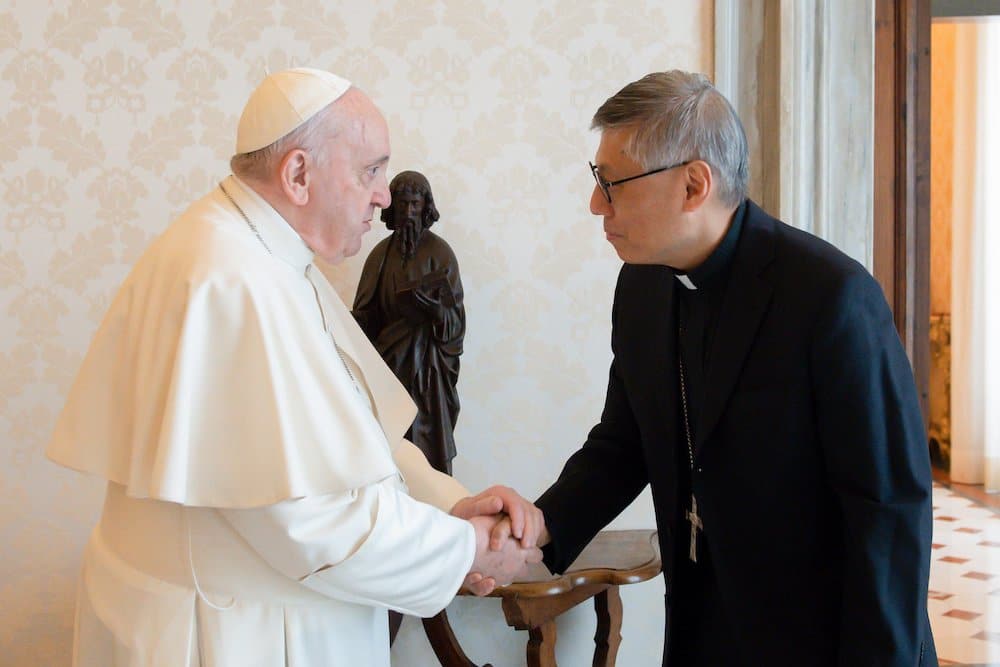
Cardinal-designate Stephen Chow Sau-Yan
Chinese Jesuit Cardinal-designate Stephen Chow Sau-Yan, 63, is bishop of Hong Kong.
He was born Aug. 7, 1959, in Hong Kong and he studied psychology and philosophy at the University of Minnesota, earning a master’s degree in educational psychology before joining the Jesuits in 1984. Cardinal-designate Chow was ordained a priest in Hong Kong in 1994. He received a degree in organizational development from Loyola University in Chicago and earned a doctorate in human development and psychology from Harvard University. In 2018, the cardinal-designate was appointed provincial superior of the China province of the Jesuits.
Pope Francis appointed him to lead Hong Kong’s 404,000 Catholics as their bishop in 2021, a role Cardinal-designate Chow told local press that he had initially turned down but later accepted after receiving a handwritten letter from the pope. As bishop, he made the first trip to Beijing by a Hong Kong bishop in nearly three decades.
The cardinal-designate has expressed his desire for those arrested during the 2019 protests in Hong Kong against a Chinese extradition bill to be treated with leniency. After his nomination as cardinal, he expressed his hope that “there will be more reconciliation” in Hong Kong and that “more hope can be given to young people.”
The Vatican has had increasingly strained relations with China primarily due to apparent violations of an agreement between the two countries which outlines procedures for the appointment of bishops. However, in May 2023, Cardinal-designate Chow said that he did not believe the agreement was “dead.”
He will become Hong Kong’s fourth cardinal.
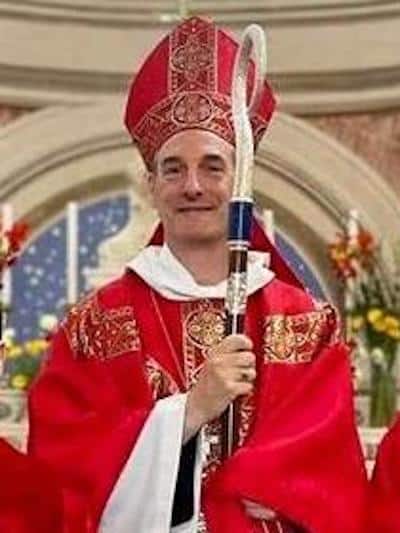
Cardinal-designate François-Xavier Bustillo
Spanish-born Franciscan Cardinal-designate François-Xavier Bustillo, 54, is bishop of Ajaccio, France.
Born Nov. 23, 1968, in Pamplona, Spain, he was ordained a Franciscan priest in 1994, when he founded a convent with other Franciscans in southern France. He earned a master’s in theology from the Catholic Institute of Toulouse in France. From 2018 until his ordination as bishop, he oversaw the St. Maximilian Kolbe convent in Lourdes and was episcopal delegate to the shrine at Lourdes and for the protection of minors.
In 2021, Pope Francis named him bishop of Ajaccio on the French island of Corsica off the coast of Italy.
Cardinal-designate Bustillo is the author of a book published by the Vatican’s publishing house titled, “Witnesses Not Officials: The Priest in a Changing Age,” which he said was not a “manual for becoming a good priest” but a sort of pastoral letter to fellow priests. Pope Francis gave copies of the book to priests at the chrism Mass on Holy Thursday in 2022 and on other occasions.
In his book, the cardinal-designate reflects on the risk of transforming the parish into administrative offices and isolating the laity. He calls for a conversion among the clergy that is “not cosmetic” but “a true conversion from the head to the feet.”
“Today the motor of our Western society is led by finance and politics. Knowledge, power and appearances dominate the way in which we exist in the world,” he wrote. “Should this logic be promoted in the Church?”
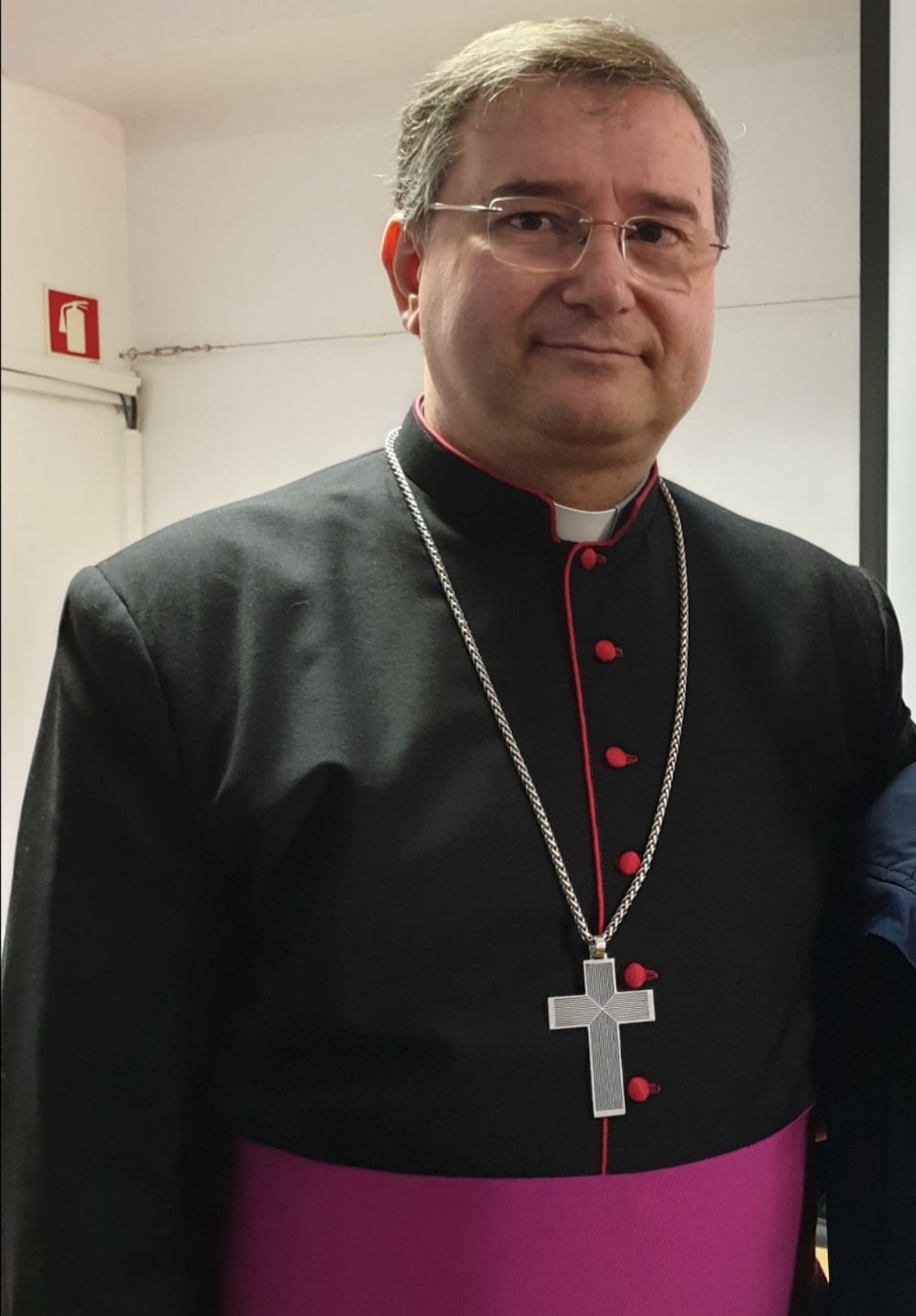
Cardinal-designate Manuel Alves Aguiar
Portuguese Cardinal-designate Manuel Alves Aguiar, 49, is auxiliary bishop of Lisbon, Portugal, president of the World Youth Day Lisbon 2023 Foundation and director of communications for the Patriarchate of Lisbon.
Born Dec. 12, 1973, outside of Porto, the future cardinal was described as a “radical environmentalist” in his youth by the Portuguese press for defending his town’s river from pollution, and he was reportedly very active in the Portuguese socialist party.
Growing up, the cardinal-designate was a catechist, reader at Mass, altar server and boy scout. He earned a degree in theology and later a master’s degree in communication sciences from the Catholic University of Portugal.
At 49, Cardinal-designate Aguiar will be the second member of the college of cardinals under 50, joining Italian-born Cardinal Giorgio Marengo, apostolic prefect of Ulaanbaatar, Mongolia, who is six months his junior.
He was ordained to the priesthood in 2001 and began serving as a parish priest before becoming head of communications for the Diocese of Porto from 2002-2015. Since 2016, he has been chairman of the Renascença media group, funded by the Patriarchate of Lisbon and the Portuguese bishops’ conference, which owns several popular radio stations throughout the country.
From 2016 to 2019 Cardinal-designate Aguiar was national director of the secretariat for church social communications of the Portuguese bishops’ conference.
Pope Francis named him auxiliary bishop of Lisbon in 2019. He is responsible for organizing World Youth Day 2023, which was scheduled to take place in Lisbon Aug. 1-6.
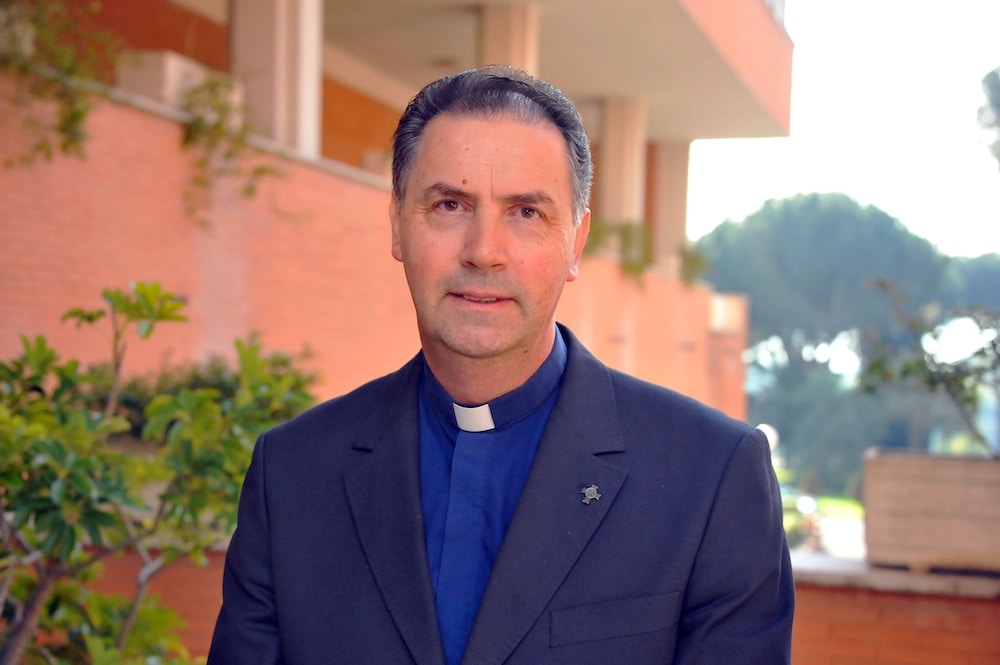
Cardinal-designate Ángel Fernández Artime
Spanish Cardinal-designate Ángel Fernández Artime, 62, is rector general of the Salesians of St. John Bosco, his religious order. He was born Aug. 21, 1960, to a fishing family in Gozón-Luanco, northern Spain.
A local newspaper noted his “marked maritime accent” in a profile on the cardinal-designate that was written after he was elected to lead the Salesian congregation in 2014. It said that for five generations his family had dedicated themselves to fishing. “I thank God for being a small-town boy,” he said then.
He made his first vows to join the Salesians at 18 years old and was eventually ordained in 1987 at 26. He holds a degree in pastoral theology, a licentiate in philosophy and pedagogy, and, as a priest, he worked in Salesian schools both in teaching and administration.
The cardinal-designate was a provincial delegate for youth ministry in Leon, Spain, and later served as provincial superior from 2000-2006. In 2009, he was appointed provincial superior of southern Argentina. Working in Buenos Aires, Cardinal-designate Fernández got to know and work personally with then-Archbishop Jorge Bergoglio of Buenos Aires, who would become Pope Francis four years later.
Asked about his relationship to Pope Francis for the 2014 newspaper profile, the cardinal-designate said that this pope “is a gift to the church.”
In 2014, he was elected rector major of the Salesians and the 10th successor of Don Bosco, a role he was re-elected to in 2020 to extend his term to 2026. He is the first Spaniard to hold the role and only the third non-Italian.
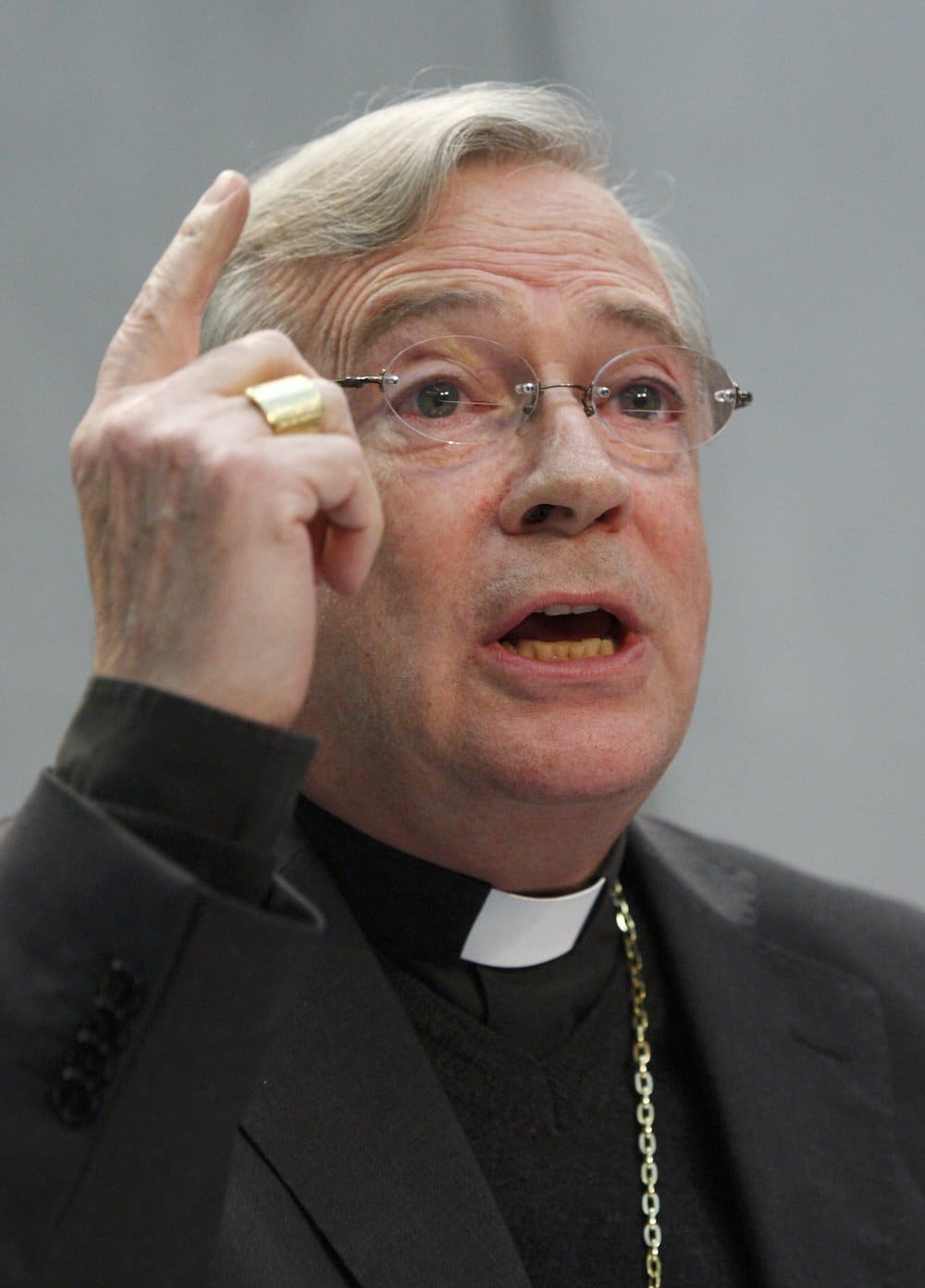
Cardinal-designate Agostino Marchetto
Italian Cardinal-designate Agostino Marchetto, 82, is a former apostolic nuncio and the former secretary, from 2001 to 2010, of the Pontifical Council for the Pastoral Care of Migrants and Itinerant People, which was merged into the Dicastery for Promoting Integral Human Development in 2016.
Pope Francis has called him “the greatest hermeneutic of the Second Vatican Council,” according to a Vatican biography of Cardinal-designate Marchetto. In his books on Vatican II, Archbishop Marchetto has argued that the council was a continuation and not a break from the history of the Catholic Church.
As a member of the College of Cardinals who is over 80 years old, he will not be eligible to vote in a future conclave. Pope Francis recognized him as one of the three new cardinals over 80 “who have distinguished themselves for their service to the Church.”
Cardinal-designate Marchetto was born Aug. 28, 1940, in Vincenza in northern Italy where he was ordained in 1964. In 1985, he was ordained a bishop and named apostolic nuncio to Madagascar and Mauritius. He became nuncio to Tanzania in 1990 and Belarus in 1994, before moving to Rome in 1999 to work in the Vatican Secretariat of State.
St. John Paul II appointed him secretary of the Pontifical Council for the Pastoral Care of Migrants and Itinerant People in 2001, from which he retired in 2010 at age 70 to dedicate himself to study — particularly on Vatican II.
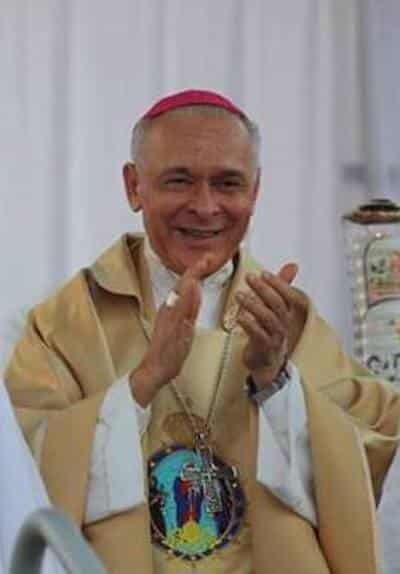
Cardinal-designate Diego Rafael Padrón Sánchez
Venezuelan Cardinal-designate Diego Rafael Padrón Sánchez, 84, is the retired archbishop of Cumaná, Venezuela, and a former president of the Venezuelan bishops’ conference.
Cardinal-designate Padrón has been an outspoken advocate for freeing political prisoners in Venezuela. “Political prisoners are typical of dictatorships; amnesty can contribute to reconciling the country,” he told local media in support of laws to free political prisoners in Venezuela.
As a member of the college of cardinals who is over 80 years old, Cardinal-designate Padrón will not be eligible to vote in a future conclave.
Born May 17, 1939, in Montalbán in northern Venezuela, he was ordained to the priesthood in his hometown in 1963. He became a parish priest and a Latin and biblical Greek professor. He holds a degree in biblical theology from Rome’s Pontifical Gregorian University and a diploma in Eastern biblical sciences from the Jerusalem-based faculty of biblical sciences of Rome’s Pontifical Antonianum University.
In 1990, St. John Paul II named him auxiliary bishop of Caracas. He became bishop of Maturín in 1994 and archbishop of Cumaná in 2002.
He was previously the president of catechesis for the Latin American bishops’ council and was twice elected president of the Venezuelan bishops’ conference, serving in that role from 2012-2018.
Cardinal-designate Luis Dri
Argentinian Cardinal-designate Luis Dri, 96, has been a model for Pope Francis’ philosophy toward confession.
The Capuchin priest, born April 17, 1927, in Federación, Argentina, has dedicated himself to hearing confessions in his soundproof confessional every morning and evening since he retired from active ministry in 2007 and has often been cited by the pope when he speaks about confession.
The cardinal-designate entered the minor seminary in 1938 at the age of 11 and was ordained a priest in 1952 in Montevideo, Uruguay, before beginning a long career as a parish priest. He was sent to Buenos Aires in 2000.
During a meeting with priests from the Diocese of Rome in March 2014, Pope Francis recalled an interaction he had with Father Dri while he was archbishop of Buenos Aires. The confessor, who always had long lines of mostly priests at his confessional, told the future pope that he felt scrupulous about forgiving too much. Yet when he felt this way, he would pray before the tabernacle and tell God: “You are to blame, because you have been a bad example for me!”
“This is a beautiful prayer of mercy!” the pope said in the meeting with priests. “If one, in confession, lives (mercy) toward himself he can also give it to others.”
The cardinal-designate told Vatican News that he does not deserve the nomination since he is a simple friar, “but life has taught me a lot, life has marked me, and since I was born very poor I feel I must always have a word of mercy, of help, of closeness, for anyone who comes here” for confession.
He said that he learned a lot from St. Pio of Pietrelcina, known as Padre Pio, to whom he confessed to in 1960.

